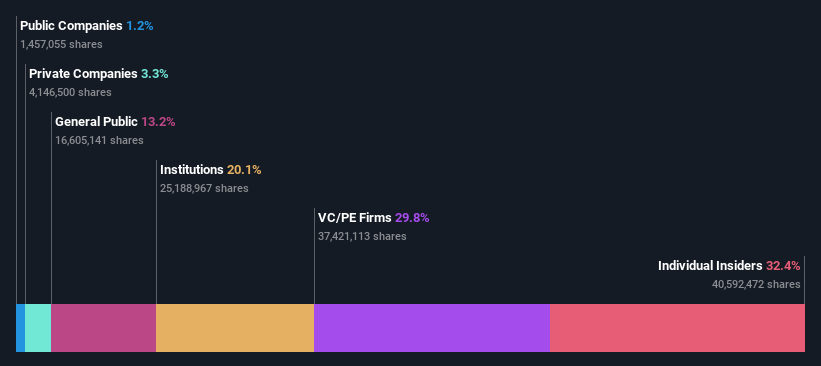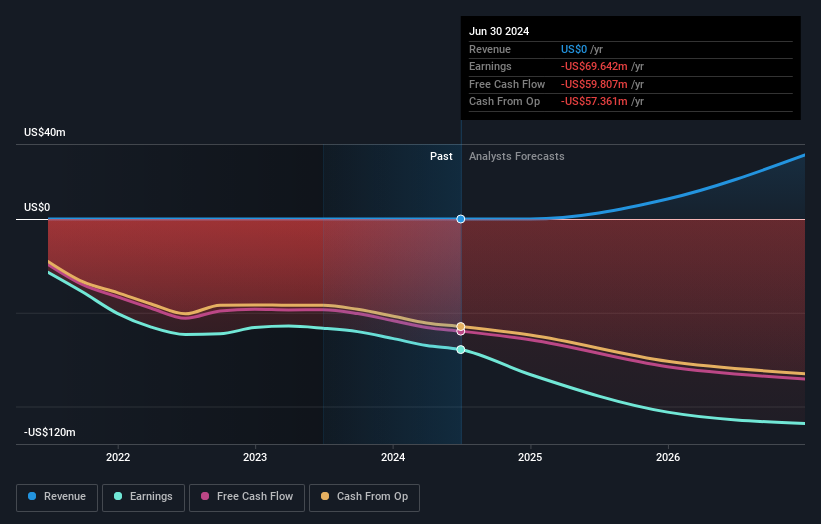- United States
- /
- Life Sciences
- /
- NasdaqCM:NAUT
Nautilus Biotechnology, Inc.'s (NASDAQ:NAUT) Top Key Executive Parag Mallick is the most upbeat insider, and their holdings increased by 11% last week
Key Insights
- Insiders appear to have a vested interest in Nautilus Biotechnology's growth, as seen by their sizeable ownership
- A total of 4 investors have a majority stake in the company with 54% ownership
- 20% of Nautilus Biotechnology is held by Institutions
Every investor in Nautilus Biotechnology, Inc. (NASDAQ:NAUT) should be aware of the most powerful shareholder groups. The group holding the most number of shares in the company, around 32% to be precise, is individual insiders. That is, the group stands to benefit the most if the stock rises (or lose the most if there is a downturn).
As a result, insiders were the biggest beneficiaries of last week’s 11% gain.
In the chart below, we zoom in on the different ownership groups of Nautilus Biotechnology.
View our latest analysis for Nautilus Biotechnology

What Does The Institutional Ownership Tell Us About Nautilus Biotechnology?
Institutions typically measure themselves against a benchmark when reporting to their own investors, so they often become more enthusiastic about a stock once it's included in a major index. We would expect most companies to have some institutions on the register, especially if they are growing.
Nautilus Biotechnology already has institutions on the share registry. Indeed, they own a respectable stake in the company. This implies the analysts working for those institutions have looked at the stock and they like it. But just like anyone else, they could be wrong. When multiple institutions own a stock, there's always a risk that they are in a 'crowded trade'. When such a trade goes wrong, multiple parties may compete to sell stock fast. This risk is higher in a company without a history of growth. You can see Nautilus Biotechnology's historic earnings and revenue below, but keep in mind there's always more to the story.

Nautilus Biotechnology is not owned by hedge funds. From our data, we infer that the largest shareholder is Parag Mallick (who also holds the title of Top Key Executive) with 16% of shares outstanding. Its usually considered a good sign when insiders own a significant number of shares in the company, and in this case, we're glad to see a company insider play the role of a key stakeholder. For context, the second largest shareholder holds about 14% of the shares outstanding, followed by an ownership of 14% by the third-largest shareholder. Interestingly, the third-largest shareholder, Sujal Patel is also a Member of the Board of Directors, again, indicating strong insider ownership amongst the company's top shareholders.
Our research also brought to light the fact that roughly 54% of the company is controlled by the top 4 shareholders suggesting that these owners wield significant influence on the business.
While it makes sense to study institutional ownership data for a company, it also makes sense to study analyst sentiments to know which way the wind is blowing. There are plenty of analysts covering the stock, so it might be worth seeing what they are forecasting, too.
Insider Ownership Of Nautilus Biotechnology
The definition of an insider can differ slightly between different countries, but members of the board of directors always count. The company management answer to the board and the latter should represent the interests of shareholders. Notably, sometimes top-level managers are on the board themselves.
I generally consider insider ownership to be a good thing. However, on some occasions it makes it more difficult for other shareholders to hold the board accountable for decisions.
Our most recent data indicates that insiders own a reasonable proportion of Nautilus Biotechnology, Inc.. Insiders own US$108m worth of shares in the US$334m company. We would say this shows alignment with shareholders, but it is worth noting that the company is still quite small; some insiders may have founded the business. You can click here to see if those insiders have been buying or selling.
General Public Ownership
The general public, who are usually individual investors, hold a 13% stake in Nautilus Biotechnology. While this size of ownership may not be enough to sway a policy decision in their favour, they can still make a collective impact on company policies.
Private Equity Ownership
With a stake of 30%, private equity firms could influence the Nautilus Biotechnology board. Some might like this, because private equity are sometimes activists who hold management accountable. But other times, private equity is selling out, having taking the company public.
Private Company Ownership
It seems that Private Companies own 3.3%, of the Nautilus Biotechnology stock. Private companies may be related parties. Sometimes insiders have an interest in a public company through a holding in a private company, rather than in their own capacity as an individual. While it's hard to draw any broad stroke conclusions, it is worth noting as an area for further research.
Next Steps:
It's always worth thinking about the different groups who own shares in a company. But to understand Nautilus Biotechnology better, we need to consider many other factors. To that end, you should learn about the 3 warning signs we've spotted with Nautilus Biotechnology (including 2 which are significant) .
Ultimately the future is most important. You can access this free report on analyst forecasts for the company.
NB: Figures in this article are calculated using data from the last twelve months, which refer to the 12-month period ending on the last date of the month the financial statement is dated. This may not be consistent with full year annual report figures.
Valuation is complex, but we're here to simplify it.
Discover if Nautilus Biotechnology might be undervalued or overvalued with our detailed analysis, featuring fair value estimates, potential risks, dividends, insider trades, and its financial condition.
Access Free AnalysisHave feedback on this article? Concerned about the content? Get in touch with us directly. Alternatively, email editorial-team (at) simplywallst.com.
This article by Simply Wall St is general in nature. We provide commentary based on historical data and analyst forecasts only using an unbiased methodology and our articles are not intended to be financial advice. It does not constitute a recommendation to buy or sell any stock, and does not take account of your objectives, or your financial situation. We aim to bring you long-term focused analysis driven by fundamental data. Note that our analysis may not factor in the latest price-sensitive company announcements or qualitative material. Simply Wall St has no position in any stocks mentioned.
About NasdaqCM:NAUT
Nautilus Biotechnology
A development stage life sciences company, engages in creating a platform technology for quantifying and unlocking the complexity of the proteome.
Flawless balance sheet with slight risk.
Similar Companies
Market Insights
Weekly Picks


Crazy Undervalued 42 Baggers Silver Play (Active & Running Mine)


Fiducian: Compliance Clouds or Value Opportunity?

Willamette Valley Vineyards (WVVI): Not-So-Great Value
Recently Updated Narratives

THE KINGDOM OF BROWN GOODS: WHY MGPI IS BEING CRUSHED BY INVENTORY & PRIMED FOR RESURRECTION


The "Molecular Pencil": Why Beam's Technology is Built to Win


ADNOC Gas future shines with a 21.4% revenue surge
Popular Narratives


MicroVision will explode future revenue by 380.37% with a vision towards success


NVDA: Expanding AI Demand Will Drive Major Data Center Investments Through 2026




